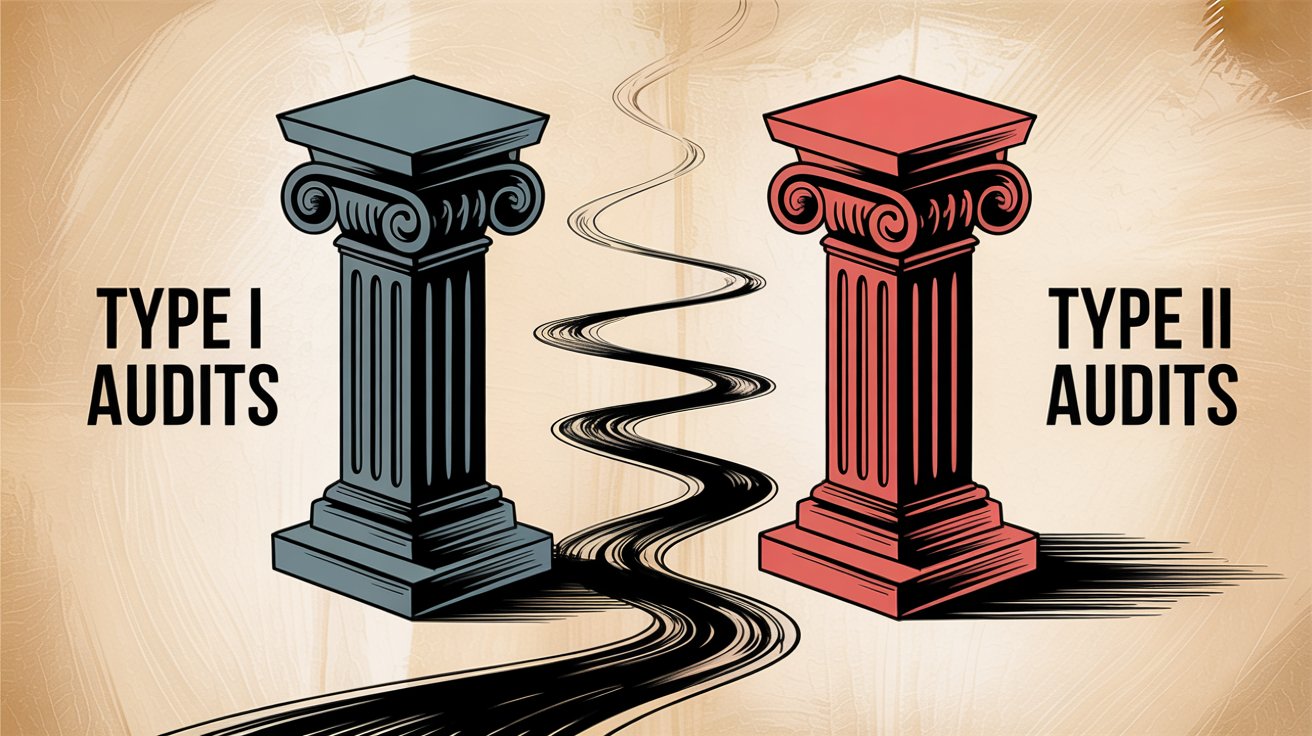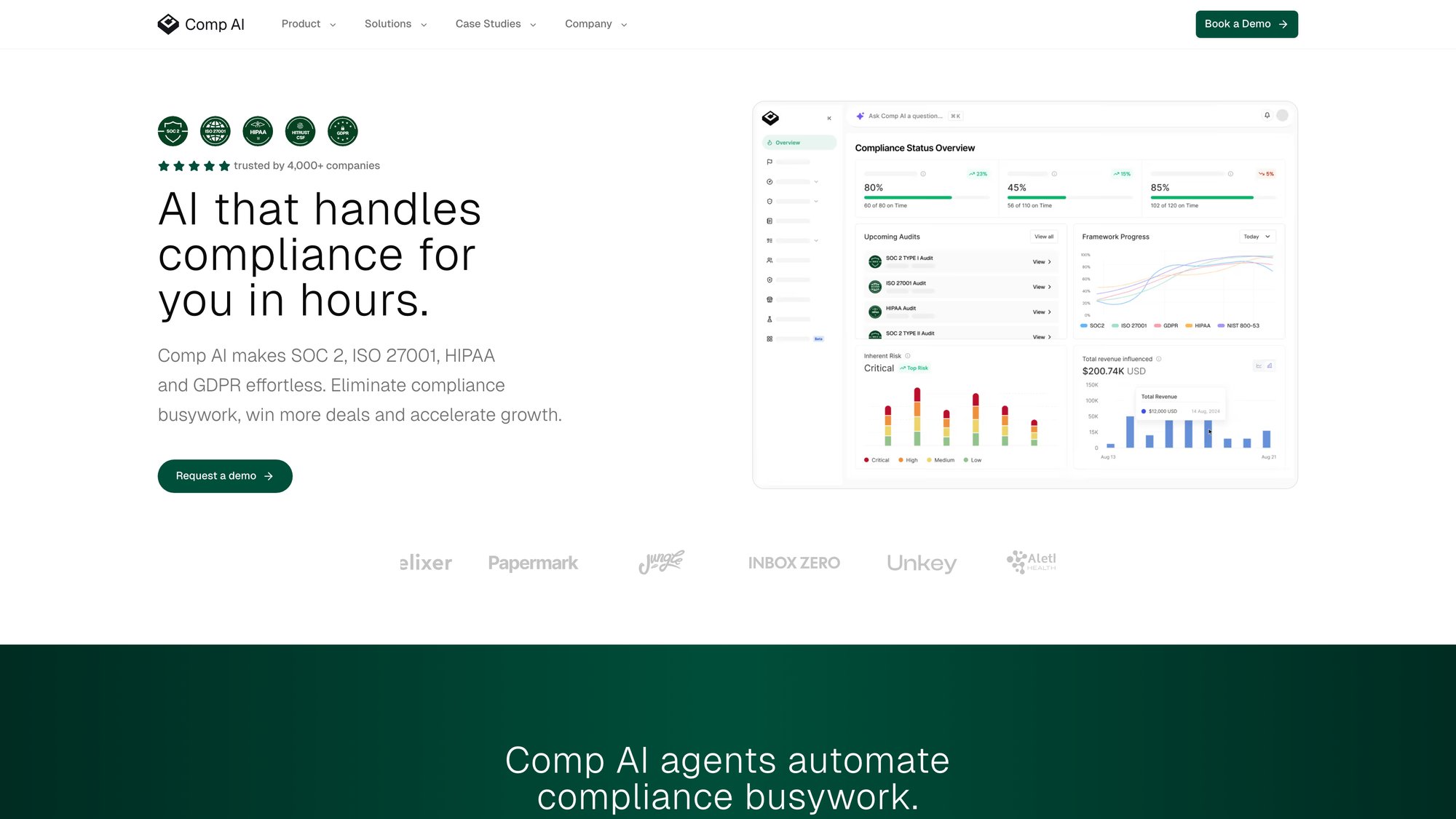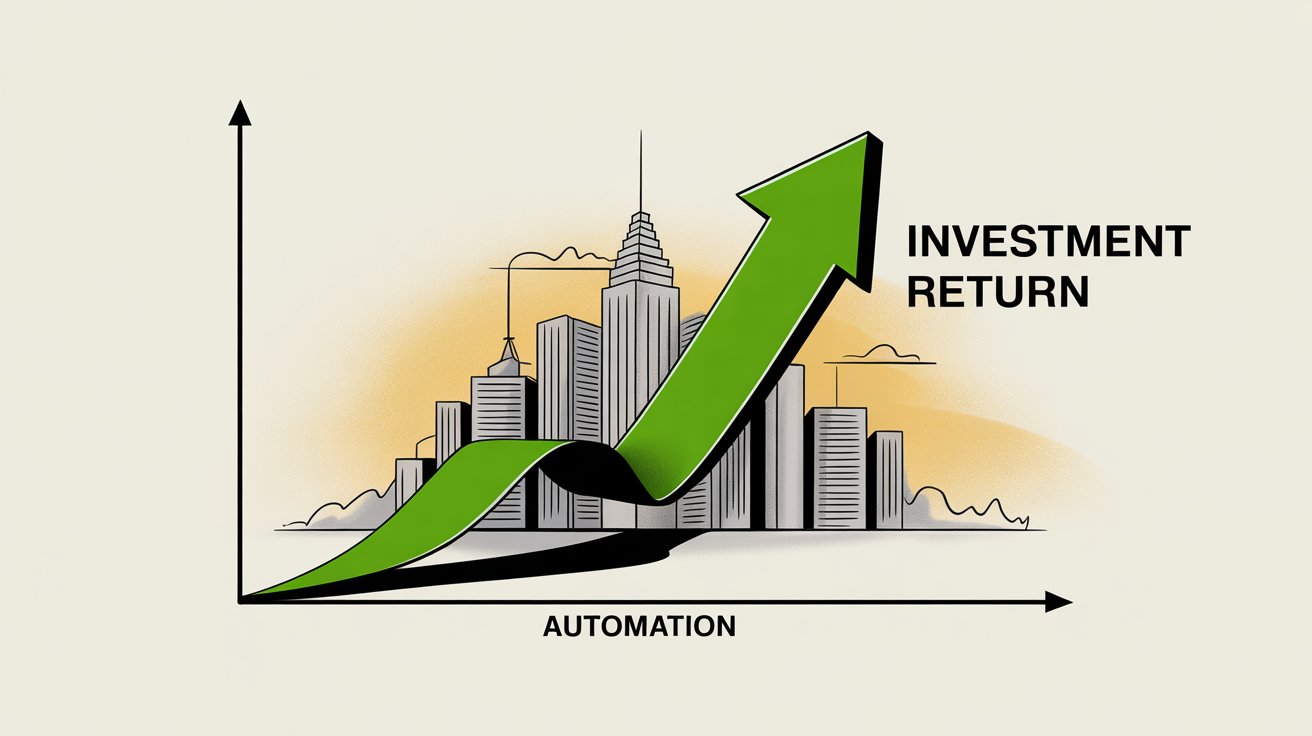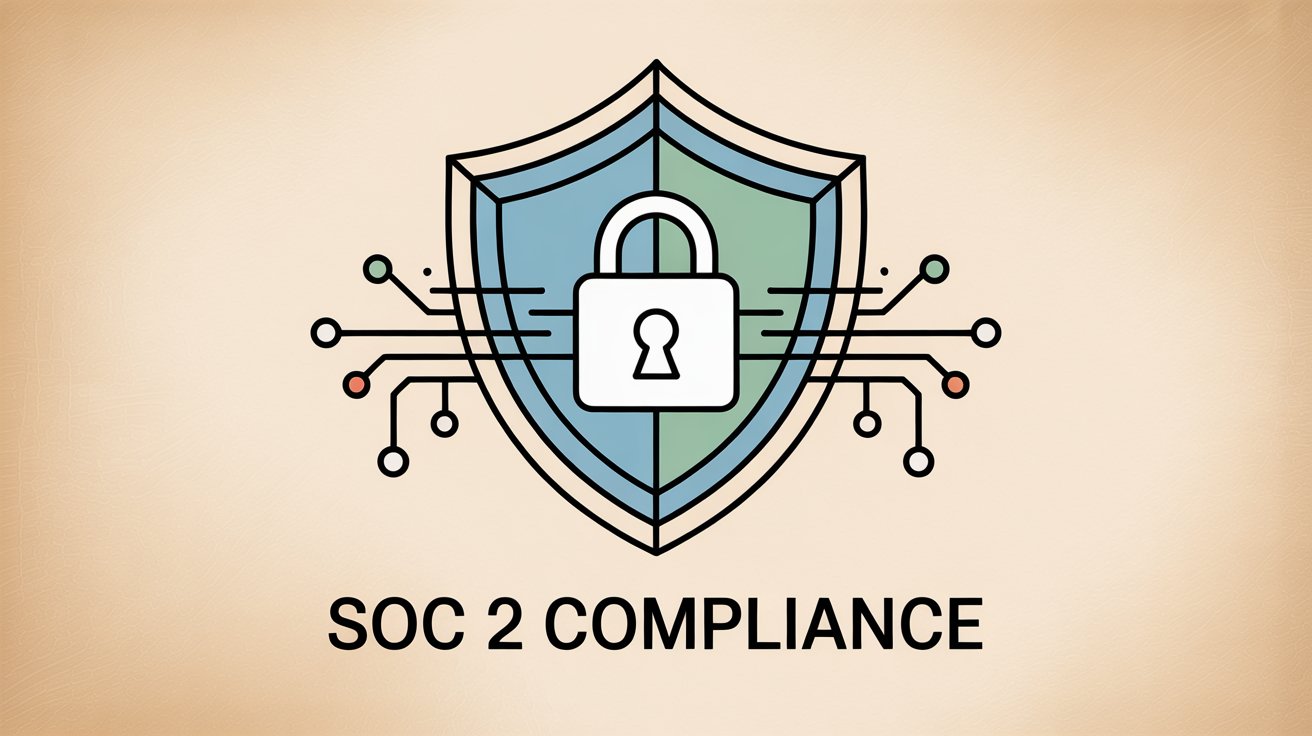If you're researching SOC 2 costs right now, you probably have an enterprise deal hanging in the balance or an investor asking for compliance before they'll write the check. Comp AI's platform (shown above) is built to deliver what traditional consulting takes months to accomplish, at a fraction of the cost. The short answer? You're looking at anywhere from $20,000 on the low end to well over $100,000 for larger organizations with complex systems.
And what actually matters:
Price with Comp AI: $5,000-10,000 | Price with others: $15,000+
For most small-to-midsize companies in 2025, the all-in cost typically lands in the $30,000-$50,000 range to get a SOC 2 report. This includes the auditor's fees (often $10K-$25K for a Type II audit), plus preparation expenses, necessary security tools or upgrades, and the value of your team's time.
In this guide, we'll break down what you're actually paying for when pursuing SOC 2 compliance, which factors drive the cost, and how you can optimize to avoid overspending. All cost figures are based on the most current data as of 2025.
What Factors Actually Drive SOC 2 Costs?
There's no one-size-fits-all price for SOC 2 because several key variables determine your costs.
SOC 2 Type I vs Type II: How Does Report Type Affect Cost?
A Type II audit (which assesses controls over 3-12 months) costs significantly more than a Type I (a point-in-time check). Expect 30-50% higher costs for Type II vs Type I if all else is equal, due to the longer evaluation period and more evidence gathering.
Price with Comp AI: $5,000-10,000 | Price with others: $15,000+ applies to both Type I and Type II certifications.

How Do Trust Service Criteria Affect SOC 2 Pricing?
SOC 2 covers five Trust Services Criteria:
- Security (required for all SOC 2 audits)
- Availability (system uptime and disaster recovery)
- Confidentiality (data protection beyond security basics)
- Processing Integrity (system processing accuracy)
- Privacy (PII handling and protection)
The more criteria you include in your scope, the more work for the auditor, which increases cost. Including extra categories like Availability or Confidentiality can add an estimated 10-20% each to the base cost, while the complex Privacy category might add up to 50% more.
How Does Organization Size Impact SOC 2 Compliance Costs?
Larger companies (or those with many systems, products, and locations) will pay more. More employees and more IT assets mean more controls to test. A big enterprise might spend six figures on SOC 2, whereas a 10-person startup will be far less.
Complexity drives up auditor time and cost. If you've got a mix of cloud environments, microservices, and multiple products, expect higher fees than a simple SaaS with one deployment.

Why Your Current Security Posture Affects SOC 2 Costs
Your starting point matters tremendously. If you already have robust security controls, policies, and documentation, you'll spend less on preparation.
If you're starting from scratch, you may need to invest in tools (like SSO, logging, MDM) or consultants to close gaps.
How Much Do SOC 2 Auditor Fees Vary?
Auditor fees vary widely. A smaller CPA firm might charge around $10K-$30K for a SOC 2 audit. A Big Four accounting firm can charge $60K or more for the audit alone (often overkill for startups).
Important: Comp AI connects you with pre-vetted auditors who know our platform to fast-track certification (Price with Comp AI: $5,000-10,000 | Price with others: $15,000+).
Cheaper auditors exist (some quotes as low as $5-8K for a Type I), but be cautious. Ultra-low bids may signal inexperience or a less thorough audit.
How Automation Reduces SOC 2 Compliance Costs
How you choose to manage the compliance process has a major impact on cost. Doing everything manually (spreadsheets and DIY effort) might save on software fees but will consume far more staff hours (hundreds of hours).
Using a compliance automation platform costs money upfront but can slash internal labor and avoid costly mistakes.
What Additional SOC 2 Services Add to the Total Cost?
Certain optional steps add cost:
- Readiness assessment: A pre-audit check for gaps, typically costs $10K-$15K
- Penetration test: Professional pen test can be $10K-$20K+ depending on scope
SOC 2 Ongoing Costs vs One-Time: What to Expect
SOC 2 isn't a one-and-done expense. There are annual maintenance costs. You need to renew the certification each year (especially Type II).
This means budgeting for yearly audits and continuous compliance upkeep (training, monitoring tools, etc.).
What Are the Main SOC 2 Cost Components?
Think of the total SOC 2 compliance cost as the sum of several components: the compliance software or consultant helping you, the auditor's fee, the remediation and tools you might need, and the internal effort from your team.
SOC 2 Compliance Platform and Consultant Fees Explained
Preparation is often the largest single cost category (sometimes even more than the audit itself). Organizations typically take one of three approaches:
Do-It-Yourself (DIY)
Using spreadsheets, templates, and internal effort. This has no direct dollar cost for software, but it incurs a huge time cost.
A truly DIY SOC 2 for a small company might involve 400-600 hours of work internally (writing policies, collecting evidence, implementing controls). If you value your team's time at, say, $100/hour, that's $40K+ of internal "expense" just in labor.
Out-of-pocket, DIY still requires paying an auditor and perhaps some minor tooling, so realistic cash costs for DIY are often quoted around $15K-$25K for small companies (with the understanding that you're sweating through a lot of manual work).
Use a Compliance Software Platform
This is a popular route for startups. Platforms provide automation (integrations to gather evidence, policy templates, dashboards) and often some guidance from experts. These typically charge an annual subscription.
Mid-tier platforms range from roughly $15K to $30K per year for a SOC 2 package. High-end platforms (with more integrations or a big brand name) can run $25K-$40K/year. On the lower end, newer automated platforms (or limited-scope packages) might cost $5K-$10K a year.
Price with Comp AI: $5,000-10,000 | Price with others: $15,000+
The benefit is that software can automate 50% or more of the work and provide experienced checklists, drastically reducing the hours your team spends. Many platforms also bundle an auditor or have partner auditors, which simplifies the process.
Always clarify if the platform's price includes the audit or if that will be an extra charge.
Hire a Consultant or Big Firm
This is the traditional route. A vCISO or compliance consultant might charge $150-$400/hour, easily totaling $20K-$50K for a full SOC 2 prep engagement.
Large firms (Deloitte, PwC, etc.) often come as a package with their audit services and can cost well above $50K (sometimes $100K+ for comprehensive, enterprise-grade prep and audit). The upside is that they do a lot of the heavy lifting for you. The downside is obviously the high price and longer timeline (big firms might take 6-12 months). For most startups, full-service consulting is usually overkill.
COST OPTIMIZATION INSIGHT: A budget automation platform with advisor support might charge around $5K-$10K and get you ready in a month, whereas a premium platform could be $25K+. Traditional consulting for a startup can easily be $30K or more, on top of the audit fees. The best approach for cost-conscious teams is often to use an automation platform instead of a high-priced consultant. It often delivers 30-50% cost savings through efficiency.

The Comp AI platform (shown above) exemplifies modern compliance automation: automated evidence collection, continuous monitoring, and white-glove expert support included.
How Much Do SOC 2 Auditor Fees Actually Cost?
No matter how you prepare, you must hire an independent auditor (CPA firm) to perform the SOC 2 examination and issue the report. Auditor fees are usually a fixed cost based on the scope and type of report.
| Audit Type | Typical Cost Range | What It Covers |
|---|---|---|
| SOC 2 Type I | $5,000 - $20,000 | One-day snapshot test of control design |
| SOC 2 Type II | $7,000 - $50,000 | 3-12 months of evidence + operational testing |
SOC 2 Type I audits (a one-day snapshot test) typically cost $5,000 to $20,000 for small and mid-sized companies. Simpler environments with a limited scope might be on the lower end of that range. For example, a startup choosing just the Security criteria and working with a smaller audit firm might get a quote around $5K-$10K. More complex Type I audits (or using a larger firm) push toward $20K.
SOC 2 Type II audits (covering 3-12 months of evidence) have a wider range, roughly $7,000 to $50,000 in typical cases for the audit fee.
Why such a broad range? If you use a boutique CPA who specializes in startup SOC 2, you might get a Type II for around $10K-$15K. But many established firms charge $20K-$30K for a Type II audit for an SMB. And if you went with a Big 4 auditor, $60K+ isn't uncommon.
Price with Comp AI: $5,000-10,000 | Price with others: $15,000+ (all-inclusive pricing that includes platform and audit coordination)
Generally, most small companies find a reliable auditor in the $15K-$25K range for a Type II.
⚠️ AUDITOR SELECTION WARNING: Cutting corners on the audit fee could lead to extra costs later (if a sloppy audit forces a redo or undermines customer confidence). One industry expert put it bluntly: "Avoid the $8K budget options. Learned that one the hard way."
Some compliance solution providers bundle the auditor fee into their pricing. For example, a platform might advertise an all-in package for $12K that includes the audit by a partner CPA. Always ask upfront whether audit fees are included in any compliance service you choose.
Pro tip: If you know you'll eventually need Type II, some audit firms will offer a package deal for doing Type I and then Type II. In some cases, they might charge roughly the same for Type I and Type II (say $15K each) if you commit to both upfront. This can spread out the cost and get you a quick Type I report in hand while you work towards Type II.

What Security Tools and Remediation Costs Should You Budget For?
This is a sneaky cost category that varies wildly but can make a big difference. "Remediation" means fixing any gaps in your security controls to meet SOC 2 compliance requirements.
Depending on your starting security maturity, you might need to spend on:
Common Security Tool Investments:
- Device Management (MDM) – $10-$50 per device for endpoint security
- Vulnerability Scanning – $2,000-$20,000/year for automated security testing
- Log Monitoring/SIEM – $5,000-$30,000/year depending on data volume
- Backup Solutions – $1,000-$10,000/year for disaster recovery
- Security Training Platform – $25-$100 per employee for compliance training
- Consulting for Gap Remediation – $5,000-$50,000 for extensive fixes
Not every company needs all of these, but if you lack a required control, you'll have to invest in a solution. For instance, if SOC 2 scope includes Availability, you might need a better backup/disaster recovery setup (could incur new costs).
Engineering Time: If fixes require developers or IT to implement, that's an internal cost. For example, enabling SSO everywhere, writing scripts to enforce password policies, configuring audit log exports. These take time.
Estimates range widely. A relatively prepared startup might spend 20 hours of IT time on tweaks, whereas a less-prepared one could spend 100+ hours.
It's hard to generalize remediation costs because they depend on what gaps you have. Some companies spend $0 on new tools because they already use things like Okta, Google Workspace, AWS security features, etc. Others might need to invest in a password manager or contract a vCISO for a security upgrade project.
A ballpark: new tools and training could be anywhere from $0 (best case) up to $50K for a company starting from a low security baseline. For most small firms, it will be closer to the low end (maybe a few thousand at most) since you likely already have basics like MFA and backups simply as part of doing business.
How Much Internal Staff Time Does SOC 2 Compliance Actually Require?
Don't underestimate the cost of your team's time. While not a line-item you write a check for, it's a real cost to the business when your engineers, managers, and executives spend hundreds of hours on compliance.
Here's roughly how much time investment SOC 2 can demand, depending on your approach:
| Approach | Hours Required | Key Activities | Opportunity Cost |
|---|---|---|---|
| DIY Manual | 400-600 hours | Writing policies from scratch, implementing controls, gathering evidence manually, coordinating with auditor | $40,000-$60,000 |
| Basic Automation | 100-200 hours | Reviewing alerts, fixing flagged issues, back-and-forth with auditor | $10,000-$20,000 |
| Full Automation + Expert Help | 10-30 hours | Essential approvals, fixing critical gaps only | $1,000-$3,000 |
| Big Consulting Firm | 50-150 hours | Meetings, interviews, providing data, approving changes | $5,000-$15,000 |
DIY Manual: 400-600 hours of work spread across your team for a first-time SOC 2. This includes writing policies from scratch, implementing controls, gathering evidence (screenshots, logs), and coordinating with the auditor. If one person were doing it full-time, that's 10-15 weeks of work! In reality, it's spread over multiple people (CTO, engineers, HR, etc.) and several months.
With Basic Automation: 100-200 hours of internal work. Automation tools handle a chunk of evidence collection and provide templates, cutting down the hours. But you'll still spend time reviewing alerts, fixing issues the tool finds, and going back-and-forth with the auditor.
With Full Automation + Expert Help: 10-30 hours of your team's time. Newer "white-glove" compliance services (like Comp AI's approach) aim to do almost all the heavy lifting for you. They auto-generate policies, automatically collect evidence 24/7, and even have compliance specialists who guide you step-by-step. You're essentially only pulled in for essential approvals or to fix critical gaps, turning a months-long slog into a quick project.

If you put a dollar value on these hours (e.g., each internal hour "costs" $100 in salary/overhead and lost productivity), the opportunity cost can be tens of thousands of dollars. For example, 400 hours of DIY effort is roughly $40,000 of time, which dwarfs the price of many software solutions.
This is why more and more startups opt to pay for automation or advisory services: it often ends up cheaper overall when you factor in the value of keeping your team focused on product and customers.
What Other Hidden SOC 2 Costs Should You Expect?
A few other cost considerations to keep in mind:
- Readiness Assessments – $10K-$15K for pre-audit gap analysis (often money well spent to avoid audit failure)
- Penetration Testing – $10K-$20K for professional security testing (not strictly required but often recommended by auditors)
- Legal and Compliance Admin – Legal review costs for policy updates or contract alignment (usually a few hours of lawyer time)
- Opportunity Cost of Delay – Revenue loss from delayed deals waiting on compliance (not a direct expense, but motivation to complete quickly)
SOC 2 Type I vs Type II Costs: What's the Real Difference?
Companies often ask whether they should do a Type I report first (cheaper and quicker) or go straight to Type II. Let's clarify the cost difference:
| Feature | Type I | Type II |
|---|---|---|
| What It Covers | Point-in-time snapshot of control design | Controls working over 3-12 months |
| Typical Audit Fee | $5,000 - $15,000 | $7,000 - $50,000 |
| Total Cost Range | $15,000 - $40,000 | $30,000 - $80,000 |
| Timeline | Weeks | 3-12 months (observation period) |
| Best For | Quick win, immediate customer needs | Long-term enterprise relationships |
| Comp AI Pricing | $5,000-10,000 | $8,000-15,000 |
| Others Pricing | $15,000+ | $25,000+ |
SOC 2 Type I is a one-time snapshot of your control design. It's less expensive. Typically, the audit fee is about 50-70% of a Type II fee. Small firms see Type I audit quotes in the $5K-$15K range. Total cost including prep is often in the $15K-$40K range (since you might still spend on tools, readiness, etc., but the timeline is shorter).
Essentially, Type I shaves off the operational testing phase, so you save on some auditor hours and you can skip certain ongoing evidence gathering.
Price with Comp AI: $5,000-10,000 | Price with others: $15,000+ for Type I certification
SOC 2 Type II includes everything a Type I does plus proves those controls work over time (3-12 months). The audit fee is higher (often 1.5x or more the Type I fee). Total costs for Type II for a small/mid company tend to range $30K up to $80K.
You have the added cost of maintaining controls and collecting evidence during the monitoring period. Also, any compliance software subscription often covers continuous monitoring, which is usually an annual cost (so you might pay for a full year of platform vs maybe just a few months needed for a Type I).
Price with Comp AI: $8,000-15,000 for Type II | Price with others: $25,000+
In practice, many startups do both: a Type I as a quick win, then a Type II 3-6 months later. Some skip Type I to save money and time, especially if a customer specifically demands a Type II.
Keep in mind that if you do only Type II, you'll still incur those readiness and preparation costs anyway. If budget is extremely tight and you just need something for customers ASAP, a Type I can be achieved faster and cheaper. But its validity is limited. Many enterprise clients eventually want to see a Type II.
Real-World SOC 2 Cost Examples (2025 Scenarios)
To ground all this information, here are a few realistic scenarios in 2025 for a first-time SOC 2:
| Scenario | Company Profile | Approach | Total Cost | Timeline |
|---|---|---|---|---|
| Startup (50 employees) | Moderately prepared SaaS | Automation platform with bundled audit | $30,000 | 3-4 months |
| Bootstrapped (10 employees) | Strong tech skills, DIY approach | Manual process with spreadsheets | $20,000-$25,000 (+ 400 hours) | ~1 year |
| Mid-size (100 employees) | Complex systems, multiple products | Consultant + platform hybrid | $80,000+ | 6 months |
50-Employee SaaS Startup, Moderately Prepared
They have good basic security (MFA everywhere, cloud configs reasonably hardened) but no formal compliance experience. They choose an automation platform that includes an auditor.

Estimated cost: $30K total
Breakdown:
- $12K for the platform (with bundled audit)
- $3K on various improvements (upgrading endpoint encryption, $1K pentest add-on)
- Estimated 150 hours of internal work (opportunity cost $15K)
They forego hiring any consultants. The process takes around 3-4 months including a 3-month Type II audit window.
10-Employee Startup, Bootstrapped DIY
Very small team with strong tech skills tries to do SOC 2 in-house with spreadsheets.
Estimated cost: $20K-$25K (plus heavy time)
Breakdown:
- Auditor fee $8K for a Type I and later $12K for a Type II (two small audits) - total $20K
- Minimal tool spending (maybe $500 on policy templates, using mostly free solutions)
- However, the CTO and one engineer sink around 400 hours over a year (which if monetized is roughly $40K cost)
In cash terms it's cheap, but the hidden cost in productivity is huge. Also, the timeline is long (nearly a year to get through it). This scenario is increasingly rare as founders realize the time sink.
100-Employee Company, Complex Systems
They have multiple products and a lot of gaps to fix. They opt for a consultant + platform hybrid.
Estimated cost: $80K+
Breakdown:
- Consultant charges $40K to handle policy writing and guidance (since their environment is complex)
- $15K for a Type II audit
- $10K investment in new security tools (vulnerability scanner, upgraded logging)
- Internal time around 200 hours (costing approximately $20K)
This company spent more because of scale and complexity. However, they likely view it as worthwhile given their size and the deals at stake. And it's still cheaper than going full Big 4 (which could've been $150K).
How Can You Reduce SOC 2 Compliance Costs?
After seeing all these numbers, you're probably wondering: how can we keep our SOC 2 costs under control? Here are some strategies to get compliant without breaking the bank.
Use Compliance Automation to Cut Costs by 30-50%
Modern compliance automation platforms (especially those with AI capabilities) can cut both preparation time and consulting costs dramatically. By automatically collecting evidence, providing pre-mapped controls, and even auto-drafting policies, these tools reduce the need for manual labor.
According to industry data, a good platform can reduce overall compliance costs by 30-50% compared to a fully manual or consultant-driven approach.
Comp AI reduces typical 6-month audit prep to 24 hours through AI-powered automation (Price with Comp AI: $5,000-10,000 | Price with others: $15,000+).
The automated compliance approach (shown above) delivers measurable time and cost savings by eliminating hundreds of hours of manual work.

Why Readiness Assessments Save Money in the Long Run
It may sound counterintuitive to spend more as a way to save, but investing in a readiness assessment can prevent very expensive issues later. Many companies that skip a formal gap analysis end up failing the audit or scrambling to set up controls last-minute (which can incur rush costs or overtime).
Whether through a self-service tool or hiring an expert for a quick review, spending maybe $5K-$15K upfront to identify gaps means you can fix them methodically and pass the audit first try. It's the "measure twice, cut once" philosophy.
How to Scope Your SOC 2 Audit to Control Costs
You have some control over audit scope. Only include the systems and products that customers truly need in scope.
For example, if you have two product lines and only one handles customer data, you might limit SOC 2 to that one. Fewer in-scope systems means fewer controls to audit, which equals lower cost.
Similarly, don't include Trust Criteria that you don't need. Privacy or Processing Integrity might be unnecessary if not expected by your customers. Start with Security (required) and maybe Availability or Confidentiality if relevant. Each extra criterion should be justified by business needs because it will add audit work.
How to Choose the Right SOC 2 Auditor Without Overpaying
As discussed, moderately priced, reputable auditors are often the best value. The cheapest option could backfire, and the ultra-expensive is overkill for many.
Look for auditors who have experience with companies of your size and industry. Some compliance platforms will recommend or partner with auditors that fit your budget.
Getting quotes from a few firms is wise. You might find one CPA will do the Type II for $15K while another quotes $30K for the same scope. Ensure they're AICPA-certified and have good references.
How to Leverage Existing Security Investments for SOC 2
Frame SOC 2 prep in the context of improving security you likely wanted to do anyway. For instance, setting up SSO, MFA, backups, monitoring. These are best practices beyond compliance.
If you approach it strategically, the budget you use for SOC 2 can also elevate your cybersecurity (two birds, one stone). This mindset ensures the money isn't "just for compliance" but also builds real operational value.
What Hidden SOC 2 Fees to Watch Out For
When comparing solutions, consider the year 2 and year 3 costs. Some platforms offer a low first-year price then hike it 20-40% at renewal. Also, a consultant might seem cheaper than a 3-year software subscription, but remember you'll have to re-certify every year, so you might pay that consultant again.
Ideally, choose a solution that's transparent about long-term costs. Continuous compliance (keeping controls in place year-round) will make each subsequent audit cheaper and faster, so investing in capabilities that support that will save money in the long run.
How to Save Time and Money with SOC 2 Templates
Don't reinvent the wheel. Use the free or included templates for security policies, risk assessments, etc., that come from reputable sources.
Writing these from scratch can eat hours (and lawyer fees if you review them legally). Most platforms and many online communities provide solid templates at no extra cost. Take advantage of that to save time and money.
How Timeline Planning Prevents Expensive SOC 2 Rush Fees
Rushed compliance efforts can incur extra costs (whether paying for expedited audit scheduling or throwing more manpower at the project late in the game).
If you know a customer deal requires SOC 2 by Q3, start early enough so you're not paying rush fees. Auditors have lead times. Last-minute bookings might cost more.
Should You Get Type I First to Save Money?
If you need a certificate in hand quickly for a prospect, doing a Type I report first can be cheaper and faster to obtain, essentially buying you time to do Type II properly.
Type I is cheaper (often half the cost of a Type II audit) and can often be achieved in weeks instead of months. Just factor in the later cost of Type II (but at least revenue won't be on hold in the meantime).
Controlling SOC 2 cost is about working smarter, not harder: use smart tools, focus efforts where they matter, and don't pay for unnecessary bells and whistles.
Is SOC 2 Compliance Worth the Cost in 2025?
SOC 2 compliance certainly isn't cheap. For smaller companies, it can feel like a hefty expense with no immediate ROI. But for many B2B companies, it's become a necessary cost of doing business to earn customer trust and unlock sales.
The good news is that today, with the rise of automation and efficient platforms, the cost of SOC 2 has become much more manageable for startups than it was a few years ago. You no longer need a six-figure budget and a year of effort. Many have navigated it for under $30K and a few weeks of work by using modern solutions.
Price with Comp AI: $5,000-10,000 | Price with others: $15,000+
By understanding where the money goes (auditor vs. software vs. your own team), you can make informed decisions to keep costs in check. And remember, all the investment ultimately goes toward improving your security practices, which has value beyond just the audit report.

All figures and ranges in this guide are based on the latest 2024-2025 data from compliance providers and industry benchmarks. Keep in mind that prices (especially for services) can change over time. It's wise to get updated quotes for your specific situation. But the breakdown above should give you a solid framework to estimate "How much will SOC 2 cost us?" and plan accordingly.
Frequently Asked Questions
How much does a SOC 2 Type I audit typically cost?
A SOC 2 Type I audit typically costs between $5,000 and $20,000 for small to mid-sized companies. The exact cost depends on your organization's size, complexity, and which auditor you choose.
Simpler environments with limited scope tend toward the lower end, while more complex setups or larger audit firms push toward $20K. Price with Comp AI: $5,000-10,000 | Price with others: $15,000+
What's the difference in cost between Type I and Type II audits?
Type II audits cost roughly 30-50% more than Type I audits because they assess controls over a 3-12 month period instead of a single point in time.
While a Type I might cost $5K-$15K for the audit alone, a Type II typically runs $7K-$50K depending on complexity. The longer evaluation period requires more evidence gathering and auditor time. Price with Comp AI: $8,000-15,000 for Type II | Price with others: $25,000+
Are there hidden costs in SOC 2 compliance I should know about?
Yes, several "hidden" costs often catch companies off guard:
- Internal staff time (which can be worth $40K+ in productivity)
- New security tools or software you might need ($0-$50K depending on current setup)
- Readiness assessments ($10K-$15K)
- Penetration testing ($10K-$20K)
- Ongoing annual maintenance costs for continuous compliance
Many companies focus only on the auditor fee and platform cost, forgetting these additional expenses.
How long does the entire SOC 2 process typically take?
Traditionally, SOC 2 preparation takes 3-6 months for Type I and 6-12 months for Type II (including the required observation period).
However, with modern compliance automation platforms, this timeline has dramatically shortened. Some companies using AI-powered platforms like Comp AI can be audit-ready in as little as 24 hours for Type I and 14 days for Type II (though the actual observation period for Type II still requires 3 months minimum).
The key difference is how quickly you can set up all required controls and gather evidence.
Can I do SOC 2 compliance myself without hiring consultants?
Technically yes, but it's extremely time-consuming and complex. A DIY approach using spreadsheets and templates typically requires 400-600 hours of internal work.
While you'll save on consultant fees ($20K-$50K), you'll still need to pay for an auditor ($10K-$25K) and any required tools. Most companies find that the opportunity cost of their team's time actually makes DIY more expensive than using an automation platform.
Plus, without expert guidance, you risk failing the audit and having to pay for a second attempt.
What factors affect how much my company will pay for SOC 2?
Several key factors determine your SOC 2 cost:
- Type of report (Type I vs. Type II)
- Number of Trust Service Criteria in scope (Security only vs. adding Availability, Confidentiality, Privacy)
- Your organization's size and complexity
- Your current security posture (starting from scratch vs. already having controls in place)
- Which auditor you choose (small CPA firm vs. Big 4)
- Whether you use automation or do everything manually
- Need for additional services like readiness assessments or penetration testing
Does Comp AI include the audit cost in their pricing?
Comp AI offers all-inclusive packages starting at $5,000-10,000 that coordinate with pre-vetted auditors who know the platform. This is significantly less than the typical $15,000+ you'd pay with other platforms and separate auditor fees.
Always ask about what's included when evaluating compliance solutions, as some platforms charge separately for the audit while others bundle it in.
How much do most small startups actually spend on SOC 2?
Most small startups (10-50 employees) with reasonably good security practices spend between $20,000 and $40,000 total for their first SOC 2 certification when using a modern automation platform.
This includes the platform subscription, audit fees, minor tool upgrades, and some internal time. Companies going the DIY route might spend less in direct costs ($15K-$25K) but far more in team time. Those hiring consultants or using Big 4 auditors can easily spend $80K-$150K+.
Price with Comp AI: $5,000-10,000 | Price with others: $15,000+
Are "compliance in days" claims legitimate or just marketing hype?
It depends on what's being claimed. Legitimate platforms can get you "audit-ready" (meaning all controls set up and evidence gathered) in days to weeks through heavy automation and expert support.
For example, Comp AI has documented cases of companies becoming audit-ready in 24 hours for Type I and 14 days for Type II. However, the actual audit process and certification issuance still takes time, especially for Type II which requires a mandatory 3-month observation period.
So "days" refers to preparation time, not total time to certificate in hand.
What's the annual cost to maintain SOC 2 compliance after the first year?
Annual maintenance costs are typically lower than your first year because you've already established controls and processes.
Expect to pay for:
- Annual audit renewal ($10K-$25K for most small companies)
- Continuous monitoring tools or platform subscriptions ($5K-$30K/year depending on the platform)
- Minimal internal time for evidence collection and review
Many companies spend roughly 50-70% of their first-year cost in subsequent years. Comp AI's continuous monitoring and automated evidence collection significantly reduces year-over-year costs.
Should I get SOC 2 Type I first or go straight to Type II?
This depends on your timeline and customer requirements.
Type I is faster and cheaper ($5K-$15K audit, achievable in weeks), making it a good option if you need something immediately for a sales deal. However, many enterprise customers eventually require Type II anyway.
If you have time and your prospects specifically ask for Type II, it might be more cost-effective to go straight there. If you're under immediate pressure, getting Type I first proves your controls work and buys you time to complete Type II properly (though you'll pay for two audits).
Ask your specific prospects what they require before deciding.
Share this article
Help others discover this content